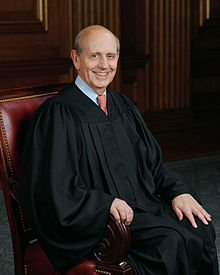Stephen Breyer
Stephen Gerald Breyer (/ˈbraɪər/; born August 15, 1938) is an American politician, academic and lawyer. He was an Associate Justice of the Supreme Court of the United States. He was appointed by President Bill Clinton in 1994. Breyer was generally associated with the more liberal side of the Court.[1]
Stephen Breyer | |
|---|---|
 | |
| Associate Justice of the Supreme Court of the United States | |
| In office August 3, 1994 – June 30, 2022 | |
| Nominated by | Bill Clinton |
| Preceded by | Harry Blackmun |
| Succeeded by | Ketanji Brown Jackson |
| Chief Judge of the United States Court of Appeals for the First Circuit | |
| In office March 1990 – August 3, 1994 | |
| Preceded by | Levin H. Campbell |
| Succeeded by | Juan R. Torruella |
| Judge of the United States Court of Appeals for the First Circuit | |
| In office December 10, 1980 – August 3, 1994 | |
| Nominated by | Jimmy Carter |
| Preceded by | Seat established |
| Succeeded by | Sandra Lynch |
| Personal details | |
| Born | Stephen Gerald Breyer August 15, 1938 San Francisco, California, U.S. |
| Spouse(s) |
Joanna Hare (m. 1967) |
| Children | 3 |
| Education | Stanford University (BA) Magdalen College, Oxford (BA) Harvard University (LLB) |
In January 2022, Breyer announced that he would be retiring from the Supreme Court at the end of the term.[2] Breyer left the court on June 30, 2022 when his retirement became official. He was replaced by Ketanji Brown Jackson.[3]
Background
changeBreyer is of Jewish descent.[4] Breyer generally supported a liberal interpretation of the law; he is pro-choice and pro-civil liberties. Breyer had the second-longest tenure as the most junior justice on the bench. Breyer was also the only justice to appear on a quiz show (Wait Wait Don't Tell Me). Before being a judge, he was a professor at Harvard Law School and a judge on the First Circuit Court of Appeals. Breyer is an Eagle Scout.
References
change- ↑ Kersch, Ken (2006). "Justice Breyer's Mandarin Liberty". 73. University of Chicago Law Review: 759.
As his decision to characterize both the New Deal and Warren Courts as centrally committed to democracy and 'active liberty' makes clear, Justice Breyer identifies his own constitutional agenda with that of these earlier courts, and positions himself, in significant respects, as a partisan of midcentury constitutional liberalism.
{{cite journal}}: Cite journal requires|journal=(help) - ↑ Seddiq, Natalie Musumeci, Oma. "Justice Stephen Breyer is retiring from the Supreme Court: reports". Business Insider. Retrieved 2022-01-26.
{{cite web}}: CS1 maint: multiple names: authors list (link) - ↑ "Justice Stephen Breyer to officially retire Thursday at noon, swear in Ketanji Brown Jackson". ABC News. June 29, 2022. Retrieved June 30, 2022.
- ↑ Genealogy records. Ancestry.com